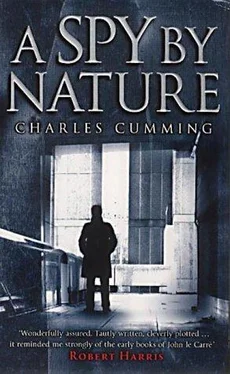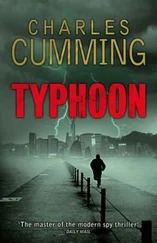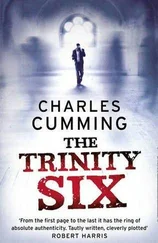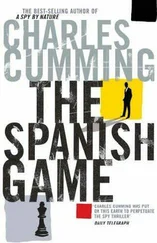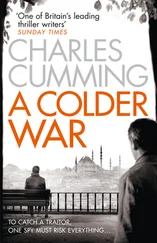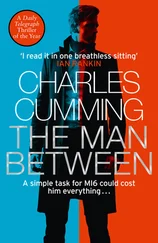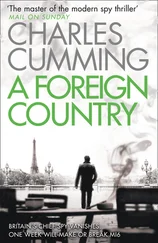Charles Cumming - A spy by nature
Здесь есть возможность читать онлайн «Charles Cumming - A spy by nature» — ознакомительный отрывок электронной книги совершенно бесплатно, а после прочтения отрывка купить полную версию. В некоторых случаях можно слушать аудио, скачать через торрент в формате fb2 и присутствует краткое содержание. Жанр: Шпионский детектив, на английском языке. Описание произведения, (предисловие) а так же отзывы посетителей доступны на портале библиотеки ЛибКат.
- Название:A spy by nature
- Автор:
- Жанр:
- Год:неизвестен
- ISBN:нет данных
- Рейтинг книги:3 / 5. Голосов: 1
-
Избранное:Добавить в избранное
- Отзывы:
-
Ваша оценка:
- 60
- 1
- 2
- 3
- 4
- 5
A spy by nature: краткое содержание, описание и аннотация
Предлагаем к чтению аннотацию, описание, краткое содержание или предисловие (зависит от того, что написал сам автор книги «A spy by nature»). Если вы не нашли необходимую информацию о книге — напишите в комментариях, мы постараемся отыскать её.
A spy by nature — читать онлайн ознакомительный отрывок
Ниже представлен текст книги, разбитый по страницам. Система сохранения места последней прочитанной страницы, позволяет с удобством читать онлайн бесплатно книгу «A spy by nature», без необходимости каждый раз заново искать на чём Вы остановились. Поставьте закладку, и сможете в любой момент перейти на страницу, на которой закончили чтение.
Интервал:
Закладка:
Charles Cumming
A spy by nature
“The Foreign and Commonwealth Office”-or “Foreign Office”-is the rough equivalent of the United States Foreign Service. Its members refer to it simply as “The Office.” The Secret Intelligence Service (SIS), commonly referred to as MI6, or “Six,” is the United Kingdom’s foreign intelligence agency. MI5, or “Five,” handles domestic intelligence. GCHQ is a signals intelligence agency located near Cheltenham, England.
- C.C. London, 2006I remember, in fact, the Lebanese woman I knew at Berkshire College say- ing to me, after I told her how much I loved her: “I’ll always tell you the truth, unless of course I’m lying to you.”
- RICHARD FORD, The SportswriterPART ONE
1995
If we hope to live not just from moment to moment, but in true consciousness of our existence, then our greatest need and most difficult achievement is to find meaning in our lives.
- BRUNO BETTELHEIM, The Uses of Enchantment1
The door leading into the building is plain and unadorned, save for one highly polished handle. No sign outside saying FOREIGN AND COMMONWEALTH OFFICE, no hint of top brass. There is a small ivory bell on the right-hand side, and I push it. The door, thicker and heavier than it appears, is opened by a fit-looking man of retirement age, a uniformed policeman on his last assignment.
“Good afternoon, sir.”
“Good afternoon. I have an interview with Mr. Lucas at two o’clock.”
“The name, sir?”
“Alec Milius.”
“Yes, sir.”
This almost condescending. I have to sign my name in a book and then he hands me a security dog tag on a silver chain, which I slip into the hip pocket of my suit trousers.
“Just take a seat beyond the stairs. Someone will be down to see you in a moment.”
The wide, high-ceilinged hall beyond the reception area exudes all the splendor of imperial England. A vast paneled mirror dominates the far side of the room, flanked by oil portraits of gray-eyed, long-dead diplomats. Its soot-flecked glass reflects the bottom of a broad staircase, which drops down in right angles from an unseen upper story, splitting left and right at ground level. Arranged around a varnished table beneath the mirror are two burgundy leather sofas, one of which is more or less completely occupied by an overweight, lonely-looking man in his late twenties. Carefully, he reads and rereads the same page of the same section of The Times, crossing and uncrossing his legs as his bowels swim in caffeine and nerves. I sit down on the sofa opposite his.
Five minutes pass.
On the table the fat man has laid down a strip of passport photographs, little color squares of himself in a suit, probably taken in a booth at Waterloo station sometime early this morning. A copy of The Daily Telegraph lies folded and unread beside the photographs. Bland non-stories govern its front page: IRA hints at new ceasefire; rail sell-off will go ahead; 56 percent of British policemen want to keep their traditional bobbies’ helmets. I catch the fat man looking at me, a quick spot-check glance between rivals. Then he looks away, shamed. His skin is drained of ultraviolet, a gray flannel face raised on nerd books and Panorama. Black oily Oxbridge hair.
“Mr. Milius?”
A young woman has appeared on the staircase wearing a neat red suit. She is unflustered, professional, demure. As I stand up, Fat Man eyes me with wounded suspicion, like someone on his lunch break cut in line at the bank.
“If you’d like to come with me. Mr. Lucas will see you now.”
This is where it begins. Following three steps behind her, garbling platitudes, adrenaline surging, her smooth calves lead me up out of the hall. More oil paintings line the ornate staircase.
Running a bit late today. Oh, that’s okay. Did you find us all right? Yes.
“Mr. Lucas is just in here.”
Prepare a face to meet the faces that you meet.
A firm handshake. Late thirties. I had expected someone older. Christ, his eyes are blue. I’ve never seen a blue like that. Lucas is dense boned and tanned, absurdly handsome in an old-fashioned way. He is in the process of growing a mustache, which undercuts the residual menace in his face. There are black tufts sprouting on his upper lip, cut-rate Errol Flynn.
He offers me a drink, an invitation seconded by the woman in red, who seems almost offended when I refuse.
“Are you sure?” she says, as if I have broken with sacred tradition. Never accept tea or coffee at an interview. They’ll see your hand shaking when you drink it.
“Absolutely, yes.”
She withdraws and Lucas and I go into a large, sparsely furnished room nearby. He has not yet stopped looking at me, not out of laziness or rudeness but purely because he is a man entirely at ease when it comes to staring at people. He’s very good at it.
He says, “Thank you for coming today.”
And I say, “It’s a pleasure. Thank you for inviting me. It’s a great privilege to be here.”
There are two armchairs in the room, upholstered in the same burgundy leather as the sofas downstairs. A large bay window looks out over the tree-lined Mall, feeding weak, broken sunlight into the room. Lucas has a broad oak desk covered in neat piles of paper and a framed black-and-white photograph of a woman whom I take to be his wife.
“Have a seat.”
I drop down low into the leather, my back to the window. There is a coffee table in front of me, an ashtray, and a closed red file. Lucas occupies the chair opposite mine. As he sits down, he reaches into the pocket of his jacket for a pen, retrieving a blue Mont Blanc. I watch him, freeing the trapped flaps of my jacket and bringing them back across my chest. The little physical tics that precede an interview.
“Milius. It’s an unusual name.”
“Yes.”
“Your father, he was from the Eastern bloc?”
“His father. Not mine. Came over from Lithuania in 1940. My family have lived in Britain ever since.”
Lucas writes something down on a brown clipboard braced between his thighs.
“I see. Why don’t we begin by talking about your present job. The CEBDO. That’s not something I’ve heard much about.”
All job interviews are lies. They begin with the resume, a sheet of word-processed fictions. About halfway down mine, just below the name and address, Philip Lucas has read the following sentence:
I have been employed as a Marketing Consultant at the Central European Business Development Organization (CEBDO) for the past eleven months.
Elsewhere, lower down, are myriad falsehoods: periods of work experience on national newspapers (“Could you do some photocopying please?”); a season as a waiter at a leading Genevan hotel; eight weeks at a London law firm; the inevitable charity work.
The truth is that CEBDO is run out of a small, cramped garage in a mews off Edgware Road. The kitchen doubles for a toilet; if somebody has a crap, no one can make a cup of tea for ten minutes. There are five of us: Nik (the boss), Henry, Russell, myself, and Anna. It’s very simple. We sit on the phone all day talking to businessmen in central-and now eastern-Europe. I try to persuade them to part with large sums of money, in return for which we promise to place an advertisement for their operation in a publication known as the Central European Business Review. This, I tell my clients, is a quarterly magazine that enjoys a global circulation of four hundred thousand copies, “distributed free around the world.” Working purely on commission I can make anything from two to three hundred pounds a week, sometimes more, peddling this story. Nik, I estimate, makes seven or eight times that amount. His only overheads, apart from telephone calls and electricity, are printing costs. These are paid to his brother-in-law who desktop publishes five hundred copies of the Central European Business Review four times a year. These he posts to a few selected embassies across Europe and to all the clients who have placed advertisements in the magazine. Any spares, he throws in the bin.
Читать дальшеИнтервал:
Закладка:
Похожие книги на «A spy by nature»
Представляем Вашему вниманию похожие книги на «A spy by nature» списком для выбора. Мы отобрали схожую по названию и смыслу литературу в надежде предоставить читателям больше вариантов отыскать новые, интересные, ещё непрочитанные произведения.
Обсуждение, отзывы о книге «A spy by nature» и просто собственные мнения читателей. Оставьте ваши комментарии, напишите, что Вы думаете о произведении, его смысле или главных героях. Укажите что конкретно понравилось, а что нет, и почему Вы так считаете.
